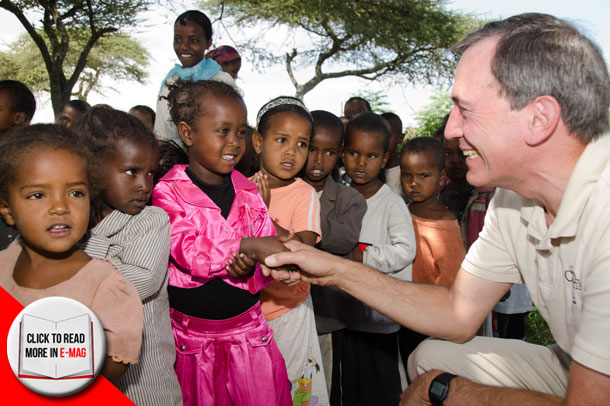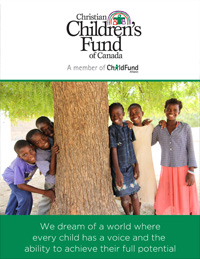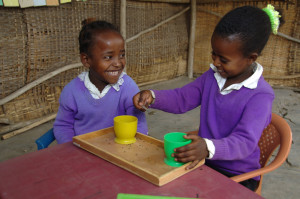We dream of a world where every child has a voice and the ability to achieve their full potential
~ By Cheryl Long
A 12-year-old Ethiopian girl arrives home one day to begin making dinner for her grandfather and brother. Her father is deceased and her mother is gone. Suddenly, the door crashes open and a group of men grab the young girl, throw her into a car and speed away. They’ve taken her against her will to become a child bride.
Fortunately, the girl’s grandfather was alerted and a group of elders from the community were able to locate the girl and return her to her home. The kidnappers were identified and banished from the community and today that girl, who is now a young teenager, is working hard to reach her goal of becoming a teacher.
This is just one of many similar stories that fuel people like Mark Lukowski, CEO of Christian Children’s Fund of Canada (CCFC). Lukowski joined the Markham, Ontario-based organization in 2009, trading a long history in the business world working for companies like Hewlett-Packard and Motorola for a role in the not-for-profit sector.
“I really enjoy it. Every day, I try to help reduce poverty in developing countries and communities where we work. My focus is to help as many children as possible reach their full potential,” Lukowski said.
In the 1930s, American Presbyterian missionary Dr. J. Calvitt Clarke and England-born Dr. Verent Mills began working with Chinese war orphans, which led Clarke to create the China’s Children Fund in Richmond, Virginia in 1938. Mills, who had been a missionary in South China since the early ’30s, joined the group a few years later as regional director in Shanghai. In the late 1950s, the organization was renamed the Christian Children’s Fund (CCF) and expanded its work from Asia into the Middle East. By the 1960s, CCF had become a global organization and growing support in Canada prompted the creation of CCFC.
CCFC is a child-focused international development organization with a mission to create “a future of hope for children, families and communities by helping them develop the skills and resources to overcome poverty and pursue justice.” They’re a member of ChildFund Alliance, a worldwide advocacy group made up of 12 child-centred development organizations working in 58 countries that operate independently under the direction of an executive team and board of directors. While CCFC was founded in the Christian faith, the organization reaches out to children and communities regardless of race, culture or religious beliefs.
Today, CCFC has sponsors for over 50,000 children and is improving the lives of more than half a million children, youth and families in six countries — Burkina Faso, Ethiopia, Ghana, India, Nicaragua and Paraguay. The work they do falls into specific areas or program sectors, specifically education, strengthening community organizations, water, sanitation and hygiene, sustainable livelihood development, emergency response, and health and nutrition. At 37 percent, the greatest amount of funds raised goes to education, followed by health and nutrition at 25 percent, according to the organization’s website. A commitment to child protection, gender equality and environmental sustainability is at the core of everything they do.
The organization focuses primarily on child sponsorship but supporters help in other ways, too. A monthly donor program for child essentials increases a community’s access to basic necessities such as clean water, nutritious food and medical care. Donations can also be made through CCFC’s annual gift catalogue, where items like a goat, drought-resistant seeds or an environmentally-efficient cooking stove can be purchased for a family. Some choose to leave a gift through their will, host a fundraiser or even donate an old car.
“Our supporters and donors are very faithful to CCFC. They give to us because they trust us. So, we have an obligation to be good stewards of the donations they support us with,” Lukowski said.
Last November, Lukowski travelled to Ghana in West Africa to visit Kpahikpaba, a community supported by CCFC. They drove for more than 120 kilometres along a dirt road to reach the village of 750, which was having solar panels installed at family huts and a water pump. The new solar-powered lighting would allow local children to study at night and it would mean the pump could now draw water from two kilometres away. Funding for the solar power project came from one of CCFC’s corporate sponsors, DUCA Financial Services Credit Union, which committed $100,000 over four years to support projects in Africa, Asia and Latin America.
In 2013, the Irma and Vincenzo Pulla Charitable Foundation (the Pulla family operates Johnvince Foods in Downsview, ON) partnered with CCFC to build and furnish a preschool in Gburimani, a rural village also in Ghana. The facility with its three classrooms, office and storage room is a far cry from the previous learning environment — either a makeshift shed or a spot under the shade of a nearby tree. The Foundation was so inspired by the project’s success that a second phase was funded to cultivate a vegetable garden, sanitation infrastructure and three rainwater harvesting tanks. This multi-sector implementation has evolved into a holistic strategy for major gift fund development, called ‘Transform Communities’.
While corporate support is immensely valuable to CCFC, the benefits go both ways. Companies can partner with CCFC as part of their mandate for corporate social responsibility, taking part in programs that can be tailored to their goals and social consciousness. For example, Lukowski explained, businesses that pride themselves on being innovative can get involved in a way that uses innovation to support a community in need.
What appealed to the Pulla family, and also attracts many of CCFC’s supporters, is the organization’s commitment to promoting sustainability in the communities where they work. An important part of the organization’s business model is to hire a country director who sets up local staff to work with local partners who help deliver the services in each community. CCFC also operates within the boundaries of the local government, respecting their guidelines and fostering an environment of collaboration.
 “We’re all about sustainability. We work with communities for 12 to 15 years; we establish baselines to determine a community’s current conditions … how many children are completing grade school, what is the disease level, what is the death rate of young children, how is the health and nutrition of young children?,” Lukowski explained. “… Over the next 12 to 15 years there’s a desire to implement programs that strengthen the community so that it can become sustainable, not reliant on CCFC support. When we leave a community, they can continue without us. That’s the goal.”
“We’re all about sustainability. We work with communities for 12 to 15 years; we establish baselines to determine a community’s current conditions … how many children are completing grade school, what is the disease level, what is the death rate of young children, how is the health and nutrition of young children?,” Lukowski explained. “… Over the next 12 to 15 years there’s a desire to implement programs that strengthen the community so that it can become sustainable, not reliant on CCFC support. When we leave a community, they can continue without us. That’s the goal.”
Moving from the profit to not-for-profit sector might seem like a big leap but Lukowski says the differences aren’t as vast as one would imagine. CCFC is run like a business, following a certain set of disciplines and remaining accountable to their donors, who much like shareholders, expect to see results in exchange for continued support. The Harvard Business Review talks about developing strategies for non-profit organizations, Lukowski said. Everything starts with your mission, he explained, and it carries on from there by developing a theory of change and a plan to implement that mission.
Long term, Lukowski hopes to see an increase in the number of communities benefiting from CCFC’s efforts. “In terms of fundraising, we’re always looking for new ways to engage with Canadians, and come up with new programs that people want to work with to support us financially.” That means expanding some of their options for giving to encourage people who prefer to donate to a cause, whether it’s clean water or improved education, rather than specifically sponsoring a child. “From a marketing point of view, we’re saying that with this approach we can attract different donors.”
“People give to a charity because they believe in the work it does. If someone is motivated by helping children in developing countries achieve their full potential, then we are confident that we provide a service that helps maximize that impact on children in a way that the donor would be supportive.”
To learn about Christian Children’s Fund of Canada, visit www.ccfcanada.ca.
NOTEWORTHY:
CCFC among list of Top 25 charities
In December 2014, the Financial Post looked at more than 86,000 registered charities in Canada and chose their top 25 based on accountability, transparency and efficiency. They were also graded on how well they reported the social impact of their work back to their donors.
CCFC made the esteemed list, receiving a very respectable B+ grade in the Children category. These are the 25 charities that the publication considers “worth donating to” after rigorous analysis based on a list of criteria. The top 25 had to spend less than 35 cents out of every donated dollar on fundraising expenses and spend less than 65 percent of their annual budget on programs and giving rather than administration, among other standards.
“It was the first time for us, and the first t ime that the Financial Post published it,” said CCFC CEO Mark Lukowski. “We were honoured and excited to be included.”
OUR PROUD SPONSORS:











